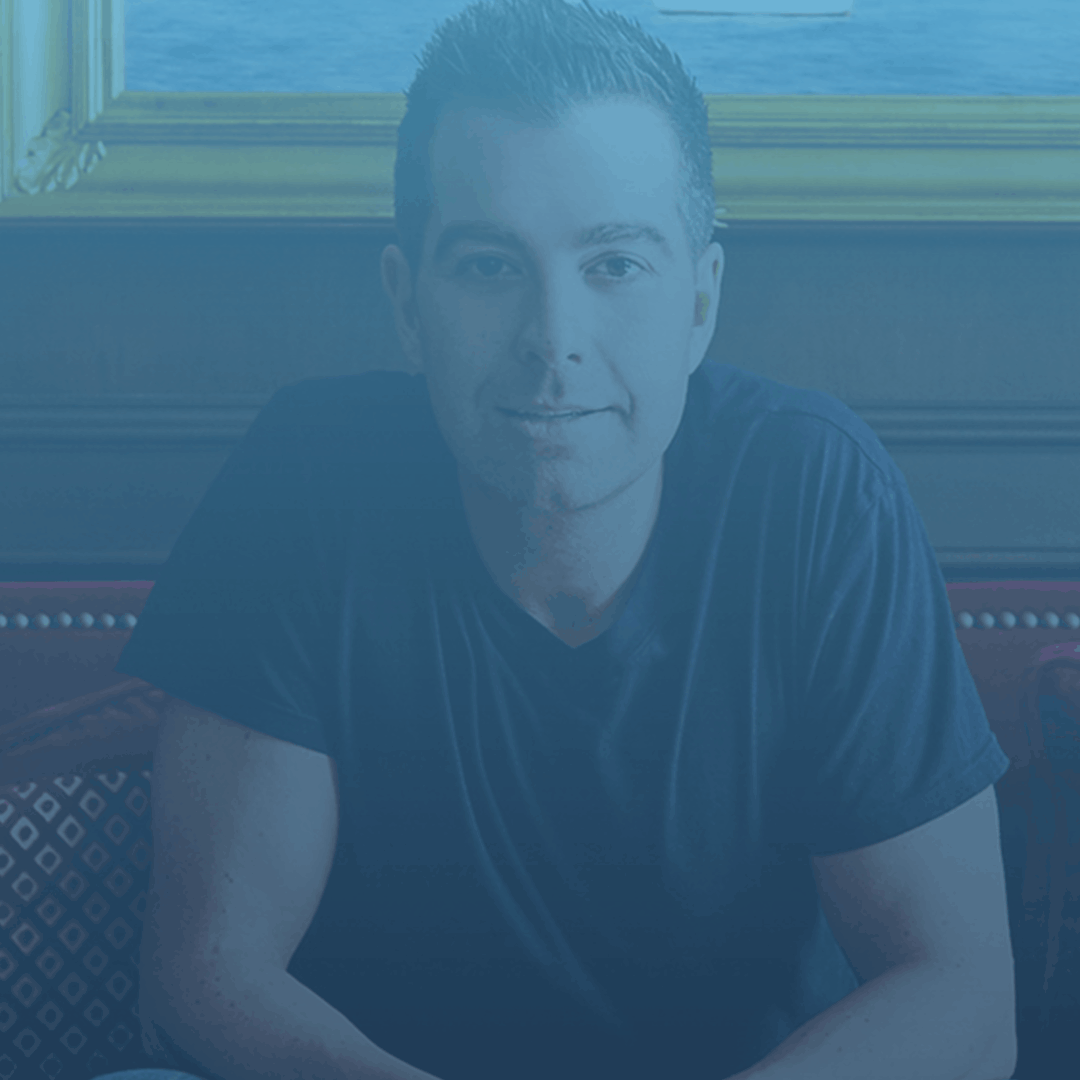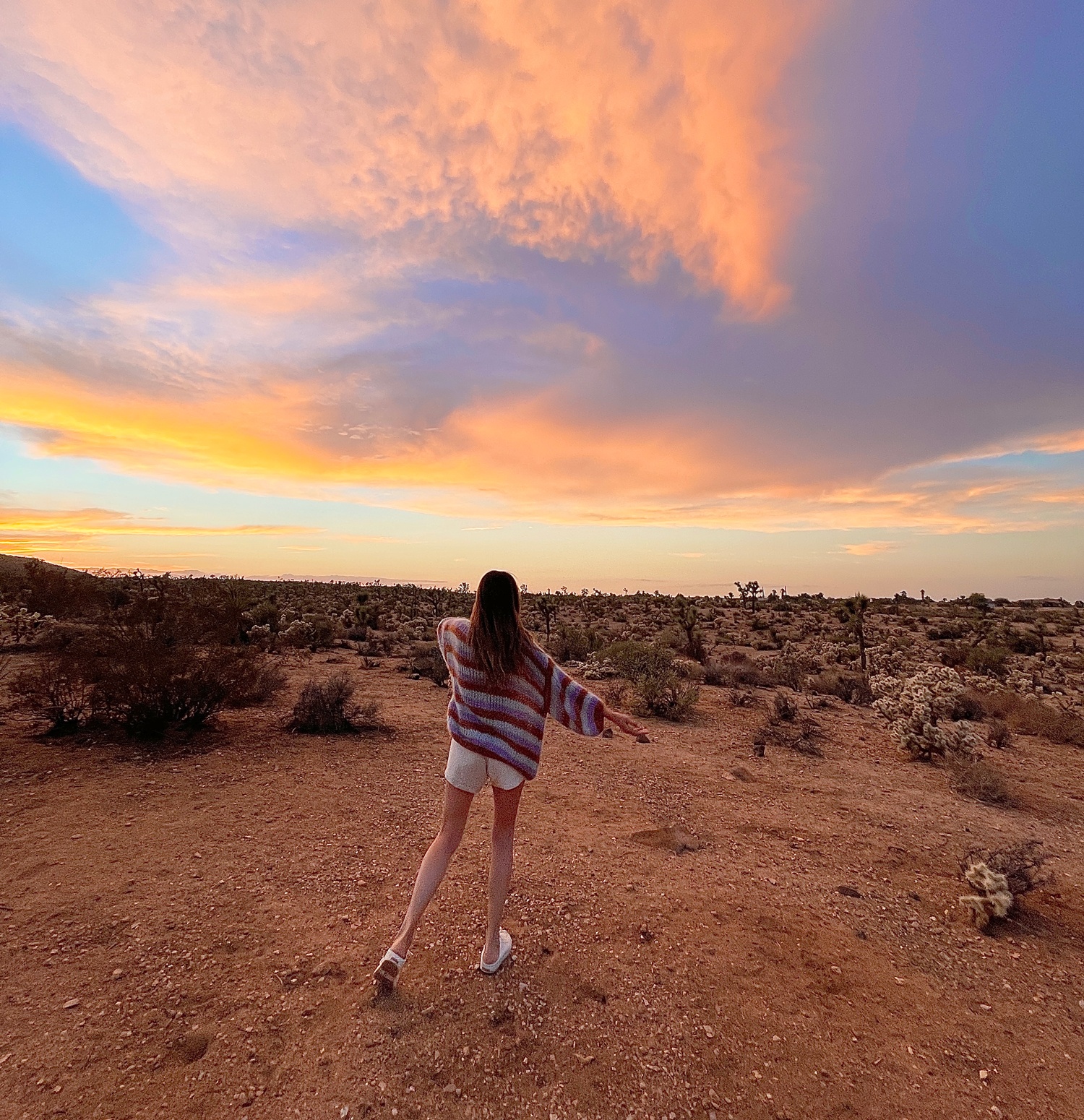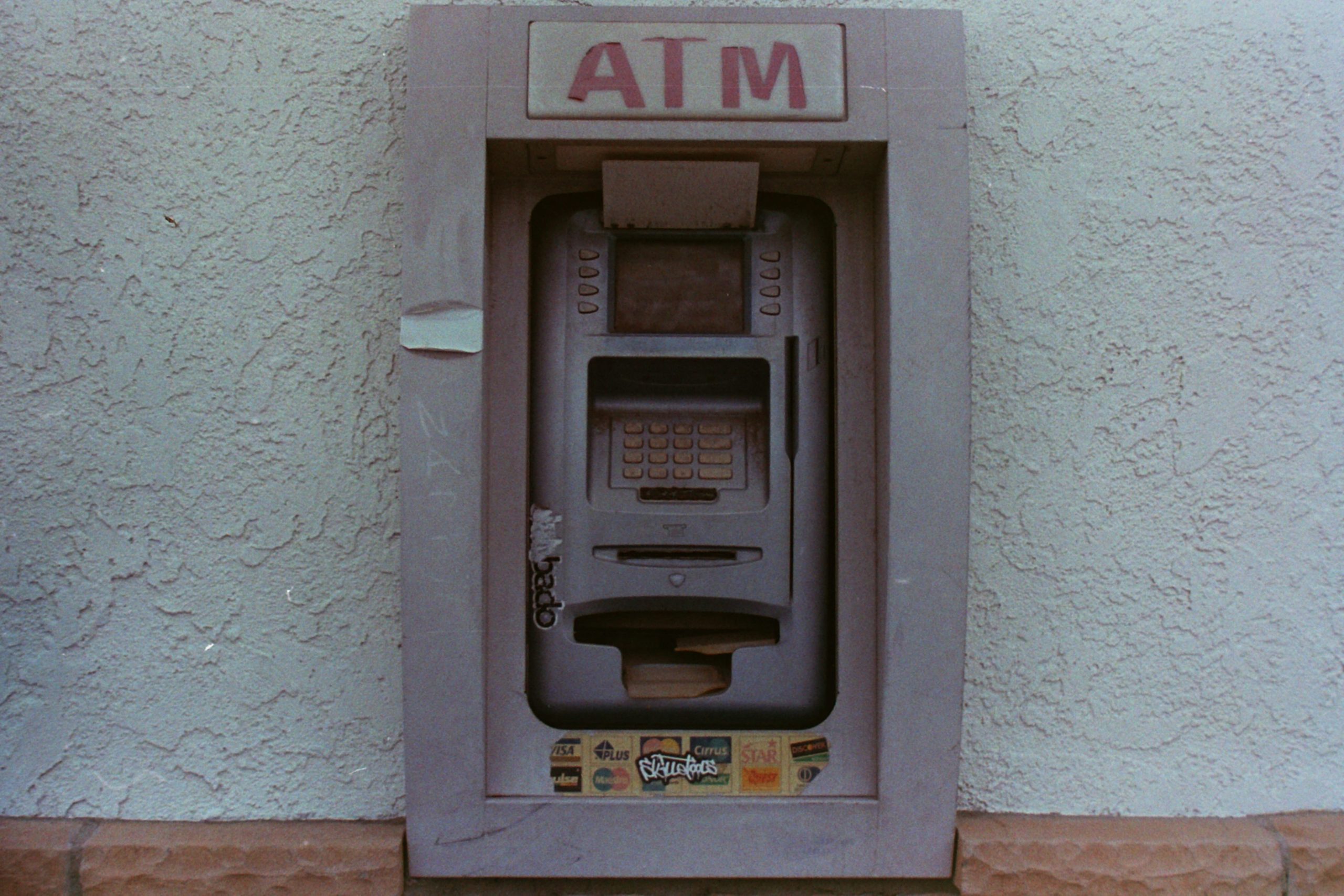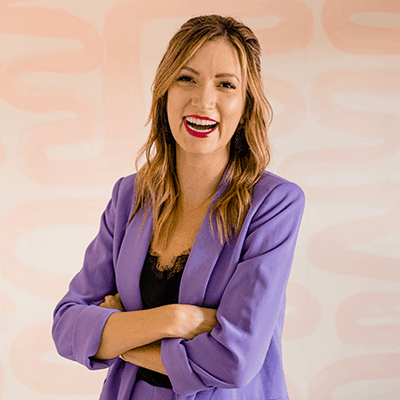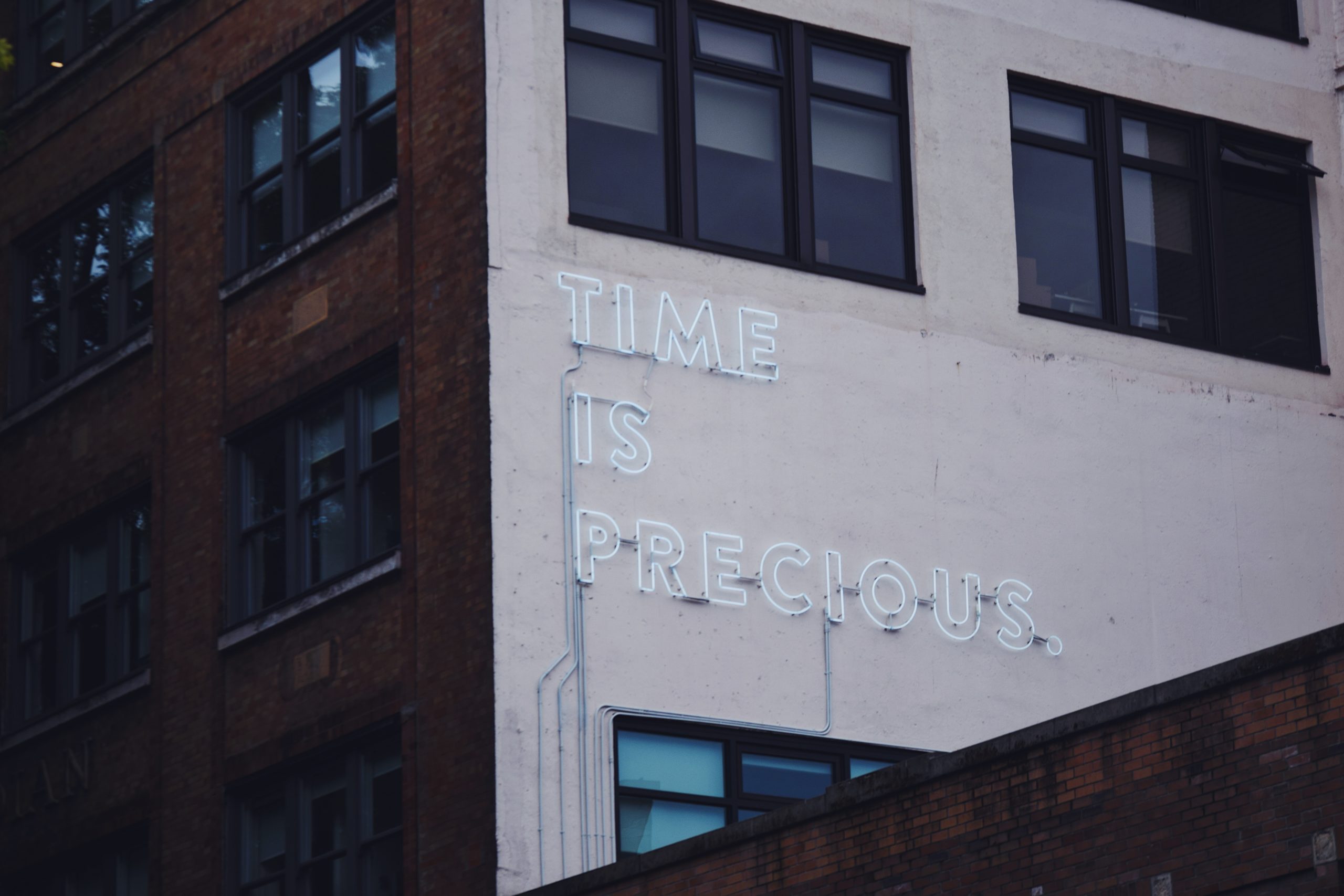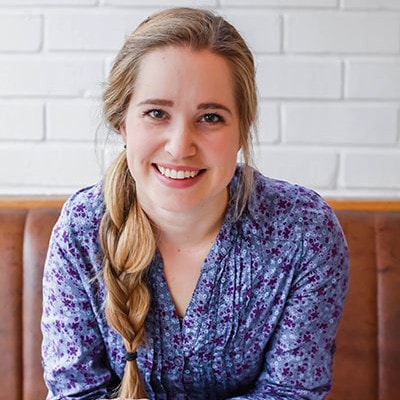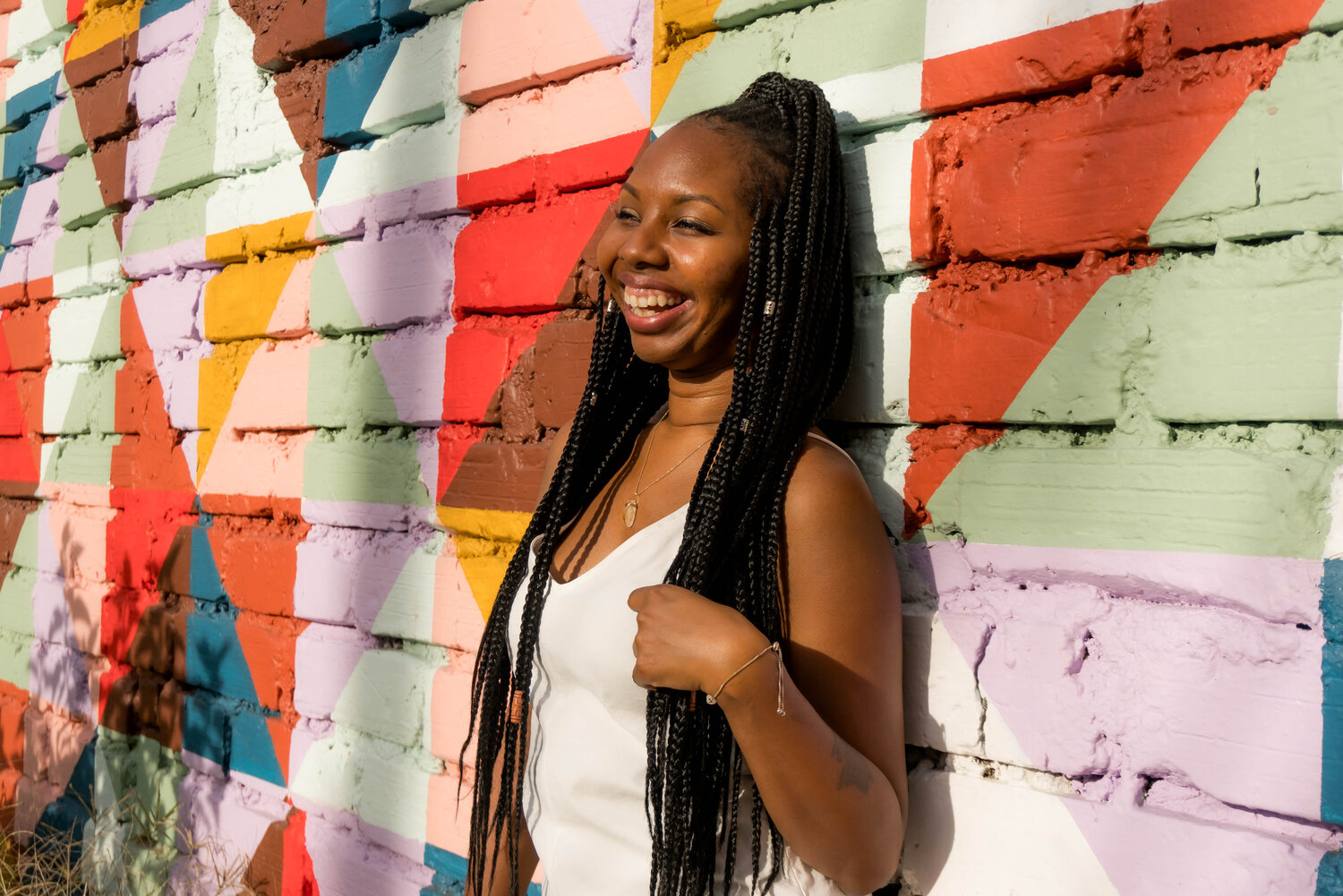I met Chris Winfield at the beginning of January, and immediately wanted him to become my best friend (no joke). Though…I have a sneaking suspicion that everyone feels that way about Chris. He’s one of the funnest, warmest, and most generous people I know.
When I met him, I was in New York City at a productivity workshop he was hosting, which we chat a bit about in the interview below. Since then, he’s grown into a great friend and mentor and has uplifted my life and business in ways I never could have done alone.
Chris has a seriously unique story — from running a huge, global marketing agency, to seeing his biggest fears come to fruition, to realizing that sometimes the worst things are the best things, to becoming one of the most sought-after publicity experts in NYC — Chris has done and seen it all.
And in this interview, he shares tons of the lessons he’s learned along the way, both about growing a stellar business, and creating a beautiful life.
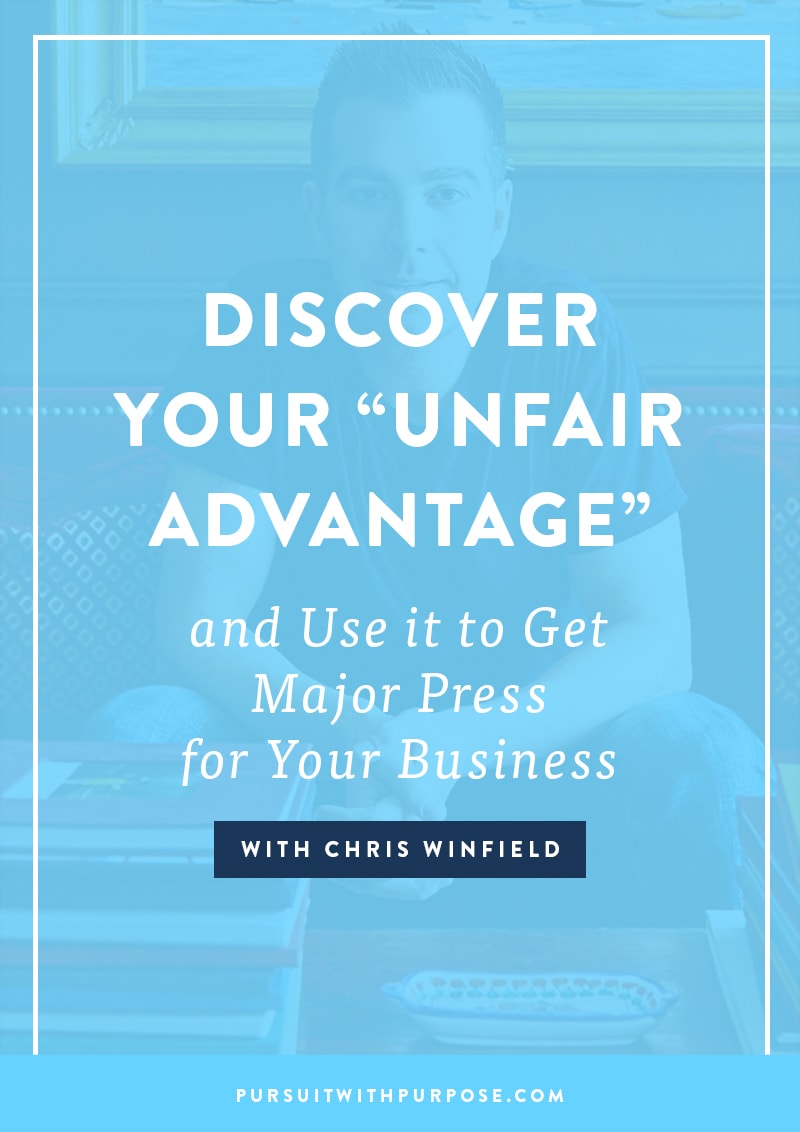
You can listen to the episode below:
Click here to subscribe to the podcast on iTunes so you’re notified of new episodes. 🙂
In this episode, you’ll hear about things like…
- What it was like for Chris to run a big, global marketing agency. And how it felt when the company (and he) fell apart.
- The moment that changed everything for him, which had to do with his daughter and a piece of pizza.
- How he became one of the most positive people I know (after years of living in pessimism).
- The real secret to productivity (which has nothing to do with time management).
- “The Unfair Advantage Effect” — Chris’ amazing take on how to get more publicity and press for your business.
- And we’re also doing a couple hot seats with Pursuit With Purpose listeners, where Chris offers on-the-spot publicity advice.
So, go listen! This episode is honestly incredible, and Chris mixes vulnerable wisdom with actionable advice. I hope you love it.
And if you’re interested in the publicity workshops he hosts, get your little booty over to this website. He has helped me SO much in my business, and I know how valuable this workshop with him will be.
Links from the interview:
- Learn more about The Unfair Advantage Intensive.
- Chris’ website.
- Chris’ Deconstructing Success podcast.
- Chris’ Instagram.
- Chris’ Facebook.
Subscribe and Review…pretty please?
Want to be the first to know when new episodes are released? Click here to subscribe in iTunes!
Also, podcast reviews are pretty darn important to iTunes and the more reviews we receive, the more likely we’ll be able to get this podcast and message in front of more people (something about iTunes algorithms?). I’d be extremely grateful if you left a review right here letting me know your favorite part of this episode!
#PursuitWithPurpose
Loving the podcast? I encourage you to use the hashtag #PursuitWithPurpose to show our PWP tribe how you live your purpose everyday. Plus, you’ll get to sift through the hashtag to find other business owners who care about community and connectedness over competition and comparison. And I’ll be reposting some of my favorite images and stories, too. 🙂
Thank you for listening!
Transcript
Read the Interview Transcription Here
Welcome back to Pursuit with Purpose, Melyssa Griffin here. Now I met today’s guest, Chris Winfield, a few months ago at one of his productivity workshops, and we became fast friends. In fact, I think Chris Winfield is the type of person who can become fast friends with anyone. That’s just the kind of guy he is. Now a few years ago, Chris was co-founding a huge global marketing agency, working with some of the biggest brands out there, making a lot of money and yet totally miserable. He tells a story in this interview that had me nearly in tears. And now, he’s living a much different life as a publicity expert and productivity coach in New York City. He’s been featured in places like the New York Times, C.N.N., and The Wall Street Journal. He’s also one of my mentors and close friends, and just has so many great pieces of advice to share with us today about both living a purpose driven life, and how to get more publicity for your business. Let’s get into it.
Melyssa Griffin: Alright, I’m here with Chris Winfield. Welcome Chris. Thanks for being on the show.
Chris Winfield: Thank you, Melyssa, one of my favorite people in the world. It’s so good to be here with you.
Melyssa Griffin: Yay, likewise. Okay, so I want to just dive right in. Now you are known right now as a PR expert. You’re amazing at publicity and productivity. We’ll touch on all of those different things in this interview. I kind of want to rewind a little bit on your story before we get into what you’re doing now. So one of the things that made me immediately gravitate towards you when I first met you, was just your honesty about what happened with your marketing agency that you used to run and be part of, and the personal effects that it had on your life. I would love if we could just start with you kind of sharing a little bit about that experience for people who aren’t familiar with it, and what was your life like when you were running that marketing agency.
Chris Winfield: Yeah, so the crazy thing is I realized that almost exactly four years ago at this time, I had just – because Facebook has the “on this day” thing, and I got one like a day or two ago. It was a blog post that I had wrote, and I don’t even think I had an actual blog at that point of my own. Everything had always been through my company, which I’ll explain. The blog post was called like “So What’s Next?”, meaning I had no clue at that point what I was going to do with my life. I had no clue what I wanted to do profession – all I knew was what I didn’t want to do.
Melyssa Griffin: How many years ago was that?
Chris Winfield: That was four years ago. I probably had – I don’t think I had – I had lost pretty much all my mind. All these terrible things had happened, all this, which is kind of insane now looking back at it, because four years seems – it seems like a lifetime ago, but the same time, it’s not that long. So what had happened was for most of my professional adult life, I don’t have one job ever. I had started an agency, and it was internet marketing, which I was always able to kind of predict what was going to be next. I was always able to get lots of publicity for. I would go and speak. So we had lots of big clients, pretty much every media company. About, I guess seven or eight years ago, I was going to sell back that company. At the last minute, I decided not to because I didn’t want to have a boss. Instead I came up with this idea, let me create a bigger agency with some of my competitors/friends and just kind of throw everything together, and that will equal something really, really great. Now looking back, that’s a terrible way to start anything and that’s such flawed logic from the beginning. So you’re going to have an idea of how it’s going to go and there is…
Melyssa Griffin: So you guys merged a few different agencies into this big agency.
Chris Winfield: Yeah exactly. It grew into – I don’t even know, 85, 100 people, something like that. We had a bunch of different offices, lots of clients. On the outside, things looked really good. On the inside, things were just a mess. We just had such difference – too many cooks in the kitchen, too many – very, very different opinions, everything. Lots of bad things happened internally. If I had said to you a year before all that, alright here’s all the worst things that could happen to me in business, they all pretty much happened. What the result of that was, was it forced me – I wasn’t happy doing what I had been doing for a long time. The way I explained it was I was comfortable being uncomfortable. My ego was too tied to it. It was like everything, I put everything into this and professionally, personally. All of my time was spent working, not effectively working, but working. I just didn’t want to make a change until I was actually forced to, meaning everything got, kind of just happened and it just imploded. I just had this realization one day that I can’t do this anymore. I didn’t like what I was doing, and it was time to completely change that.
As a result, I just – I didn’t know what I was going to do, but what I started to do was just have conversations like this, and be really honest about what I was feeling, about how I had felt about feeling scared of things, not sure of all these things. I would just – every single day, I made a promise to myself that I would have a call or a meeting, every single day. This went on for about six or seven months. Those meetings ranged from like the guy who owns the New York Times or the guy who owns Loews Hotels, to somebody else who had just lost it all. Sometimes even people that were living on the street, because I just wanted to hear and get people’s stories. What wound up happening was people, I would share something a bit, oh you know the same thing happened to me or there would be that common ground because everything – my biggest misconception was that I’m the only one who feels X. I’m the only one who feels scared. I’m the only one who feels inadequate, who feels like everyone else has it figured out and I don’t. Especially with social media, we see everyone’s highlight reels, so I look and I’m like oh my God, this person’s life is perfect. Then I meet that person and I realize they’re a mess. That’s really what was going on and what led – so it was a really long answer but…
Melyssa Griffin: I didn’t even know all of that too, like about you approaching people to learn about their stories, as kind of a way to heal what you had just been through with your marketing agency. I feel like that’s a beautiful way to grieve and to learn how to move forward.
Chris Winfield: Yeah. That was where then it all started to change. And then I realized – because I was somebody who, appearance was everything. I never wanted – I’m from New York, I never wanted anything, entrepreneur, whatever the stereotype, but closed off, all these things. I never wanted people to see or hear that I felt inadequate, or going into a meeting and feeling like oh my God, all these people are so much smarter, so much more successful, so much X.
Melyssa Griffin: Yeah, so many of us feel. It’s funny because I now knowing – I didn’t know you then, now knowing you, you’re like the exact opposite of that, like you are not that person at all anymore, which is one of the best things about you, I feel. It’s so interesting to hear that you used to be so much like that too.
Chris Winfield: Yeah. You know what’s crazy, so I’ll just tell you something quick with that. So yesterday, I had a meeting with somebody. It’s someone I know relatively well. They have access to many of the most successful, richest people in the world. It was a tremendous opportunity for me and what they wanted me to do. After the meeting, I just didn’t feel good. I didn’t feel right because it was all that – everything that we were talking about, everything was all based on ego. It was all based around everything that I used to live my life on. I was thinking about it a lot. This morning I talked about it with somebody else after, about being able to just trust, like intuition. We know what – for me, I know what’s right or wrong, or how something makes me feel, or how I can make somebody feel. And so, you know what I did right after that meeting? Instead of trying to pursue that, I just let that completely go. It’s an unbelievable opportunity. I can’t even explain what kind of…
Melyssa Griffin: Yeah, and if you guys know Chris, you know that it probably is a super unbelievable opportunity.
Chris Winfield: Yeah. So you know what I did instead, was I sent a text message to somebody that I knew was struggling a little bit. And then I just picked up the phone and call her. Because that’s it, like my mind doesn’t want me to think that being of service to somebody or showing up for somebody, that that’s going to make me feel better, or that’s what I should be doing, but it is. It always is. That’s what I try to do with all this stuff, is I – you can, and this is why I think that I am so drawn to you. When I talk to people, like I bring your name up probably once a day to somebody and be like “you got to meet this person…”, because that’s what you’re doing. And as a result, you’re becoming more and more successful and you’re going to have a bigger and bigger impact on the world.
Melyssa Griffin: Thank you. Thank you. I love that takeaway too where it’s like you know what, your intuition tells you what is the right thing to do you. Last year, I fell very much in that place, where you kind of were before, where I was focusing on the numbers and how can I up level my brand, and how can we increase our enrollment numbers, and all of these things that maybe are important for a business, but were suffocating me and my life and really misguiding me away from my true purpose and vision. There have been things even now since I’ve had this almost like awakening of oh my gosh, I don’t know want to live my life like that and that’s so not me. You had that same experience too. There have been more things or opportunities where it’s like I could do that and it probably would make more money, or do these things that used to be so important to me. But it’s that conscious decision of actually even just taking that opportunity is going to drive me further away from who I am, myself, and what I really want for my life. So I love that you said that is just listening more to your intuition and being conscious of the vision that you really want for your life.
Chris Winfield: Yeah. The interesting thing listening to you say it as well is that the other – I guess the flip side of the other thing that I was thinking about this morning is, I know that that’s really dangerous thinking for me when I attach too much to any one opportunity or any one person. And so, I was thinking even though this would give me, like it would be great, but from I guess a superficial level, but who says to, like by following and doing the things that feel right to me as a person, won’t get me there even quicker, or do even more? Looking at you, in terms of your business and also just, I think your happiness or kind of what you embody to me – I realize this sounds like a love fest to anyone listening, but it is how I…
Melyssa Griffin: We do love each other so much.
Chris Winfield: Yeah. It’s how I think, so I got to just be honest. It just becomes something that just keeps going up and keeps increasing, even though you’re not necessarily just chasing any one opportunity or like the – because you’re thinking long term. You’re also thinking with people in mind, the people that you’re serving. I think that’s an important thing because I don’t think that it has to be X or Y, like you can only – that’s one of the things. I live in New York City, I think that’s what happens to a lot of people when they think about New York City, like how could you possibly be somebody who’s nice. You can find the nicest people in the world here. You can find the biggest a**holes in the world too. Whatever you want, you’re going to find that.
Melyssa Griffin: Yeah, I like that too. Whatever you want, you’re going to find it, or whatever you’re looking for, is what you’ll find. I like that.
Chris Winfield: Or they’ll find you.
Melyssa Griffin: Yeah absolutely. So I want to kind of go back just briefly. When I first met you, so for people who don’t know – and why would you? I met Chris at his productivity workshop earlier this year. He told the story – so he was talking about his marketing agency and he told the story about basically the turning point of when he realized like I need to wake up, and this is not my life, and this is not what I wanted for myself. It had to do with a piece of pizza. It made me tear up because it was just such a beautiful, profound, subtle moment of what constituted your whole life during that period. So I’d love if you can just tell that story for people to hear it.
Chris Winfield: Yeah of course. I always joke that some people have like a white light moment or a burning bush experience, and like mine came in the form of a piece of pizza, like really sexy story. I guess it was just over four years ago, and all this stuff that happened with this business. For a while, I had been trying to fix it. It’s like again, another big lesson. When something is not – like your heart’s not into it, it doesn’t matter how much effort, how much you try to put into something, it’s not going to work. That’s another huge thing for me, is that hard work or just sweat or whatever just for the sake of it, is if you’re not in line with that, then who cares? It’s like you can work forever and you’re not going to get like a tenth, a millionth of their opportunity if you were actually into it. So anyway, side rant.
Melyssa Griffin: Totally agree though.
Chris Winfield: Yeah it’s crazy.
Melyssa Griffin: Which is like the purpose of this podcast. You really should have that vision and care about what you’re doing.
Chris Winfield: Yeah. I’d like to even come back to that because there’s also so many, I think misconceptions around like even passion or knowing what that is, or anything. So I’d like to actually come back to that because…
Melyssa Griffin: Let’s do that next.
Chris Winfield: …really important. So anyway, it was like Saturday evening and my daughter – I have this beautiful daughter and she’s just amazing. She was three at the time. I say that she’s beautiful and she’s amazing, and that’s what I would have said then as well. The only difference is that I was not present for her. I was not somebody who showed up, spent a lot of time with a nanny. I was just not – when I was there, I wasn’t there. I would be thinking about work. I’d be thinking, and then when I was at work, I’d be thinking oh I’m not a good father… But on the outside, if you saw me at the time, you would be like oh he’s such a great father, because I’d pick her up, at speaking engagements, I would be like this is my daughter, post on Facebook about something. It was all show. Anyway, in my heart, she’s the most important thing in the world, but I wasn’t – in my heart in what I was thinking, I wasn’t backing that up with action.
It was like a Saturday. She came in, I was on the phone. It was the most important phone call in the world, which I have no idea who I was talking to, what it was about, which is a good lesson for me because it’s really easy to think that this is so important. A month, a week later, sometimes an hour later, it’s like what was that even about. Why did I lose one second of anxiety or anything?
Melyssa Griffin: So, so true. Yeah.
Chris Winfield: She comes in, I’m on the phone. She looks at me and I look at her. I’m just like – I give her the look of like one minute. She knows my one minute was not one minute. So I’m kind of watching her. I’s close to dinner time. She walks over to the refrigerator. She looks at me again and I give her a hand signal, like just wait.
Melyssa Griffin: She’s three right now you said?
Chris Winfield: Three. Yeah three. She walks over, goes to the refrigerator, opens it up, takes out a piece of pizza. I’m watching her and I’m kind of now at this point just watching out the side of my eye. She looks at me again, just like with this look of like, “Come on, are you going to do anything?” I just ignored it. She goes over to the – gets a chair, pushes it up to the microwave in this giant kitchen that we had at the time. Again, like looks at me and I just ignore her, even though I’m kind of watching as this the whole time. She gets out a plate, puts the pizza on a plate, puts the pizza into the microwave, starts hitting a bunch of buttons. I’m watching this. I tell the story not because now she’s on Master Chef Junior and she’s become this amazing chef or something, but for whatever reason, and I’m sure I’ve had a hundred or two hundred similar circumstances. For whatever reason, at that moment, I was ready for the message. The message was that here is your – you talk about how your daughter is so important and your little girl is the most important thing in the world to you, but in her mind – I knew right at that point that she thought that my work was more important than she was. My work was making me miserable. So what was that? What was that message? What was she getting? For whatever reason, I got that message from her. I had that realization. I just hung up the phone in the middle of the conversation. I sat down and I just thought to myself like everything has to change.
Now the important thing about this is I had no idea what that meant. Looking back, I didn’t then all of a sudden write out a plan that culminated with this interview, on this day. I had no clue. I had no clue what that meant, what that was going to mean. What that has meant is lots and lots of uncertainty, lots and lots of stress, lots and lots… but it’s also meant unbelievable amounts of serenity, unbelievable amounts of happiness, and unbelievable amounts of feeling like I’m making a difference and following. The whole thing is, the thing that I’ve realized is that I was always living for “I’ll be happy when”. I’ll be happy when my company sells for a billion dollars. I’ll be happy when this happens, when this happens. And then that stuff would happen and I’d be happy for thirty minutes, and then I’ll be like alright, what’s next. That’s how I lived my life. The thing that I realize is that it’s not about that. It’s about the day to day. It’s about the moment. I think I sent you something this morning. It’s like all we have is right now. Right now life is perfect, at this second. If I can just think that and look down at my feet, and be here right in this moment, everything is great. It’s also having that faith and that’s, I think an important thing. I think that’s like – with what you’re doing with this mission, I think that’s the thing that I would want people, the one message, if you can get anything from all this stuff that I’m saying. It’s just like…
Melyssa Griffin: Which is so much good stuff.
Chris Winfield: Hopefully. Even if it’s not, the thing that I would say is that’s it. It’s not about having to know 100%. For me, the thing that I always think about is that was my misconception. If I need to do something, I have to know exactly what it is, the timing has got to be perfect and all that. That’s such complete bullshit, because I still – what I’m doing today might be different in thirty days, who knows? I don’t know, but all I have to do is just keep moving forward. The important thing, and this is where I disagree with some people who you have to want something 100%, 110%. For me, the way I think about it is that I just have to want it 51%. What that means is I just need to want it. There’s certain things I’m not going to want it at all, but as long as I just keep moving forward, even just an inch or one hundredth of a percent or whatever, just a little bit better you than the 49% of me that’s like “Come on, let’s put on Netflix.” Do the easy thing. Do the thing that you don’t want to do that is easy money or something like that. I’m about easy, but not when it’s not in alignment with what I know is right. That’s the thing I try to just come back to.
Melyssa Griffin: Wow. I feel like speechless with everything you just said there. So many amazing things for people to take away, from like being willing to receive the message where you said that you had probably hundreds of instances from that pizza experience, that happened before that that probably you didn’t notice because you weren’t in that place to receive it. So how can we be more open to receiving those things that will change our life. And then also, not needing to have a plan, because I think there’s probably a lot of people listening who are like yeah that’s me. I need to do something different and I need to make this change in my life, but I don’t know what I would do. So I’m just going to sit here and continue with what I’ve been doing. You don’t need to have a plan if you know in your heart that that’s the thing that needs to change, then start there. That’s your step one, knowing.
Chris Winfield: And then what’s the first step? What’s something so super small that you can do right now or today? Whatever that is. That’s the thing that I’m always thinking about is like these are mine. Somebody is listening to us right now and they’re like they have some idea of what they want to do, whatever that is. It’s very different than what they’re doing right now. So what happens with our minds work is it lumps everything together. It lumps that huge change that you want to make in your life and all the difficult steps that you think you need to take, and then it lumps that with all the stuff that you have to do right now, so for your family, for your child, for you this – all this, and it’s change. Our bodies, the amygdala, our lizard brain is set up so that change is scary, even good change, like if you’re getting married or going on a first date or moving. Those are things that are great, having a baby. They’re still scary as hell. Think about changing everything. So what you have to do, the way to fight that or the way to combat that is just take action. Action is the anecdote for everything. That’s it, and it’s something small. You break it down into the smallest thing, taking action. When you take action especially like just taking that first step like you said, which might be just be like alright I’m going to take a step. That’s. Believing, having hope, doing something, writing something down, calling up somebody, sending an e-mail. To me, I’m always looking for how can somebody – I believe anything, any problem can be solved, getting to the next level is always one connection away. It’s like one degree away from being solved. Anything like that, so make it really, really simple. Action is the anecdote, always.
Melyssa Griffin: Yeah, I 100% agree. I feel like by now people can tell that you are just this amazingly positive, optimistic, sees the bright side of everything in life kind of person. I know that you weren’t always like that. So how did you become like this? What changed in your life or what did you do that made you such a positive person?
Chris Winfield: I was pretty much the opposite for most of my life. I worried about what was the worst possible thing that was going to happen. Something bad happened, I thought oh my God, why does this have to happen to me. Why do I always have this bad luck? Whatever it is. At some point, I think about seven or eight years ago, it was just like where I was done with that. The best way that I can explain it is feeling unbelievably exhausted and having that moment, a God moment. I don’t care if somebody believes in God or doesn’t. For me, that’s what it was. I didn’t know that at the time because I was so not into any belief, in anything greater than me ever. I realize looking back at that now, and again, I probably have others things like that that had happened, but I ignored them. I didn’t know that that is what it was at that time. I only know that from having being able to have some type of perception, being able to look back and realize that. Again, it was just a matter of slowly changing and slowly stripping away all of the beliefs. I was somebody who always had to know everything. I didn’t want to – I was so set in one belief.
Now I absolutely love not knowing things. That sounds really weird, but I surround myself with different people. I meet so many different people. Most of the time, even though it won’t seem like that from this interview where I’m talking so much, but I’m listening. I want to know. I want to know this story. I know your story. I know where you come from and what got you here. That’s the interesting stuff to me, because I can learn. I can get some – I read so much. I’m reading all different types of things. I’m trying to…
Melyssa Griffin: You are a big reader.
Chris Winfield: Yeah and I try to surround myself with all different people who – so I’m not inside of my little safe bubble where I know everything. Because guess what? I need all the other support. I need everything. I thrive off of good people’s energy. So again, getting to that point, I think a big part became when I started to just incorporate gratitude into my life. Gratitude is like a thousand game changer. That started maybe five years ago. My mentor at the time said to me the first night we met, we’re having dinner. He said, “Listen, I want you to send me a gratitude list every single day and I’ll text you one back.” He said, “Just text me three things you’re grateful for every day.” It sounds so silly to me now, but that was like oh my God, really. I’ve done that with him for a long time until* one of my best friends for – I don’t even know now for how many years, but like every single morning I just text that gratitude list. Some days if I’m in a good state then it’s – not a good state, not New York or something…good spiritual state. It’s even more important when I’m not, when I’m not completely positive or something goes wrong. That’s when this stuff matters. That’s when thinking like an optimist – it matters when all the bad stuff happens like losing a business, losing all your money, like my brother died. All these different things, because lots of “bad things” have happened to me in the last seven, eight years or so, but I choose not to look at them as bad. The difference was I started to look at them as what am I learning from this, what’s going to come out of this.
Something I’ve realized is I don’t know what I don’t know. So I don’t know what the big plan is. So many things that I looked at is like the worst possible thing that could have ever happen, but I now look back at that same exact experience and like that was the best thing that could have ever happened to me in my life. It didn’t feel like that at the time or the next day or the next day, maybe it took me six months. Now the only difference is like the time gets so much shorter. If something “bad” happens, like it’s usually really quick when I get to the point like that’s why, alright amazing, thank you.
Melyssa Griffin: Yeah, that’s such a beautiful way to look at it, is gratitude. And then gratitude primarily also for those things that we think are the horrible things that are happening to us, because they’re always leading us to something that is part of that big plan.
Chris Winfield: Yeah exactly.
Melyssa Griffin: I like how you touched on the fact that it’s a choice. You made the choice. You’re in this place where you’re like this sucks. I don’t want to do this anymore. I don’t want to be like this anymore. You really just made a choice to change something and to connect with people, and to read, and to decide that you are not the person with all the answers. I think that’s amazing. I love that advice.
Chris Winfield: Any given time – like I’ve had some crazy things going on personally for months. I tell people and they’re like how are you – like they’ll get depressed for me. I’m like no. I mean it will all work out. So it’s not like it’s easy to say all this stuff, but for me, I have to live it. I have to be in it each day. When this stuff is harder, it becomes even more important, like having a good routine, having good habits, being able to connect doing these things.
Melyssa Griffin: Yeah I love that. I love that. For anyone listening, I would recommend finding that person that you can text your gratitude list to every morning. I think that’s such a simple and amazingly effective thing that you can do with just a friend, anyone.
Chris Winfield: Exactly. All I do – while you’re getting that, is that I just think of what happened to me in the last twenty-four hours, who are the people that came into my life or the things that happened. And then I just look around the room, whatever room I’m in. I’m like there are so many things that I take for granted. Look at all this and then I just write that stuff out.
Melyssa Griffin: Yeah I love that. So when I met you at your productivity workshop, I went into this workshop – so if you guys don’t know, Chris does and has taught plenty of workshops about basically how to become more productive. That’s what I thought the workshop was all about. I was like I’m going to get all these productivity hacks and learn how to structure my day. I went to the workshop and I was mind blown because 80% of the workshop wasn’t even about productivity. It was about creating a vision and a purpose for your life. It was almost like oh I get it now. I get productivity and motivation now. So I’m curious, like why did you structure it that way? Where at this “productivity” workshop was more so about your vision and purpose for your life than it was about productivity. How are those linked together?
Chris Winfield: One of the things – and just from knowing lots and lots of different people at all levels of success. So again, I live in New York, so I have access to so many amazing people. I live on the Upper West Side where there’s – I’m surrounded by celebrities and billionaires and multimillionaires, and all these different types of people. One of the things that I really discovered was that it’s really easy to be somebody who – I don’t like saying quote unquote, but I’m going to; “successful” and be completely miserable. Because what happens is there’s like a big difference between achieving something – like you can be really good at achieving things, but if they’re not the right things, you’re not going to be set up for a happy life. And really, that’s what becomes really – that’s the most important thing. Whatever time you realize that in your life – it took me a long time, and not just your own happiness, but what are you giving back. I believe for me, that I can’t be at my optimal productivity levels for across my life if the whole thing’s not working well. For me, it’s like these four areas: my mind, my body, so like my mind, my mental health, my body, my physical health, emotional health, and things like that, and spiritual health. So that’s where the gratitude side comes in. And then also my business, my career heath, whatever. They’re all pretty much equal, and not that they’re equal at all times, but if I have to be paying attention to all of those. I can’t just be putting everything into one, because then the rest of my life is going to suffer.
So what happen is that I realize that just teaching people how to get better at doing something or how to do something faster, if it’s not the right thing, what’s the use? You’re just going to be more miserable because they’re getting more done. It has to be – and again, this is my thoughts and it could be different for other people, but for me, the way I look at it is like I had to know what I wanted. Now that’s a hard thing. I’ve been trying to figure that out my whole life. What if there’s ways to think about that without making it super pressure, or just thinking? That’s why I start with – well one, I start with just my story and making people understand that the guy teaching this is not somebody who has anything, doesn’t have it all figured out, was completely unproductive, completely miserable – all these things. That is important for me because I know there’s all these gurus out there with everything, whatever it is, productivity, spiritual products, who make you think that they have it all figured out and their lives are perfect and all this. No, I know many of them, they’re not. I don’t want to learn – because I’ve never met anyone who hasn’t gone through hardship.
So it’s about starting there, starting with like the big vision and then just work backwards, because once you understand what you want, then it’s just easy. All you have to do is just keep working backwards, working backwards. Going back to what we were talking about before, you just work back to what I do I need to do now, what can I do today, tomorrow. That’s it. You don’t have to have this huge plan or anything. If you don’t understand that and you just keep working towards this thing that you think you want because your parents told you or because society tells you, or because you’ve invested a lot of time and money into it but you hate it, no you’re going to be miserable. I’m not going to do that.
Melyssa Griffin: It makes so much sense when you think of it that way, where it’s not about finding a new productivity hack. It’s about finding what that purpose or vision is for your life and then just working backwards, because once you have that, you’re so excited to execute on it. That’s the thing that you’re here for and that you want to be doing. Complete sense.
Okay, so shifting gears a little. I want to get into what you really work on, what you teach people and help people with now, which is a lot related to publicity and press and media. You are probably the most connected person that I know. You are connected to so many successful, amazing people in all different industries and all over the world. You just shine in this area and you help so many people with it. So you’ve coined this term called the Unfair Advantage Effect. What do you mean by that? Can you explain that to us?
Chris Winfield: Let me give you where that came from. I’m in this, we call it the Dad Mastermind. It’s myself, Todd Herman, Jonathan Fields, and Ryan Lee. All amazing guys, just unbelievable. We were meeting one day. We give each other very honest feedback. They were talking about something, or we were talking about me. Every time that I’m there, one of the things that I’m always doing with them is like they’ll talk about something and I’ll be like oh my God, I need to connect you to X. X will be somebody that I know, not just think, that I know will be able to help them with whatever the issue is. It becomes like almost a running joke, because they’re like is there anyone you don’t know… And then I start to feel self-conscious about always saying it, but I say it anyway. It goes back to what I was saying before. I was always believe for me, just being able to reach out or ask somebody for something or any solution to any problem, any issue, any getting to that next level, is always just like that one connection away. I just know because I do it for people all the time. Something that might take somebody six months, I can accomplish in thirty seconds with an introduction to that person and save them six months, or maybe they couldn’t even get it.
Anyway, they were talking about – and I think Todd Herman said, who you and I both know well, I need a year* and everything. So he was saying, he’s like, “Listen, whenever we’re describing you to somebody, we don’t talk about the productivity stuff or any of that.” He’s like the way I describe is like you give me an unfair advantage. What he meant by that is that by being able – and I’m not comfortable saying things about myself, but I’m going to say it anyway just because it’s relaying his message. By being somebody who has a pretty great network, an amazing network, I invest – that’s what I invest in. I don’t invest in company, I just invest in people. I invest in my relationships. By being able to also, the way my mind works is I can figure out what’s the win-win situation for these two people. It’s never like just one person looking to get something. I’ll always know. So I’ve connected you to lots and lots of different people. I’ll always know what you are bringing to the table with them, which is why that’s the only types of referrals that I’ll make to people.
What happens with that is that it automatically cuts away – like both people know going in that this is a good person, this is a person that I can help. So they feel more comfortable like asking. And then the other person is coming in thinking the same way. What happens is it just cuts away all the time that you would need to meet and find that person. Usually, it’s people that you just can’t reach out to, and they’re too busy or whatever. I only do a few things well, but one is just knowing how to position something. So whether that’s with a brand or whether that’s with a person, but what’s the unique thing about them that they do better than anyone, that they bring to the table for this. What happens is that just takes somebody and just super charges the time that their whatever, their forward momentum with marketing, with anything, publicity. As a result, it gives somebody an unfair advantage. We all have these different unfair advantage, then I can help people figure out what that is for them and kind of quickly, I can just understand that. So that’s really what it is.
Melyssa Griffin: What would you say are the first few steps for someone who’s trying to figure out what their unfair advantage is?
Chris Winfield: Well I think always starting with understanding what you already have. So what happens is that somebody – like let’s just think about publicity for a minute. I talk to lots of people, unbelievably successful people that have pretty much every part of their business figured out. They’ll start asking about publicity or media coverage or something, and they’re like, “I’ve never been able to craft that.” I look and it just amazes me because it’s really simple, but it’s all based around relationships. It’s based around creating these win-win relationships especially now. Even thinking about somebody who’s maybe just starting out, they probably closer to being able to get publicity, get media coverage than they think. The first thing to think about is, and I do this with anything, write down the list of the twenty most influential people you know. They don’t have to have anything to do with your business or that you’ve met, but think about like your parents or your parents’ friends or people you went to school with, or whatever. And then just assign these people two different scores. So one, based around like your niche. Let’s say you’re focused on media coverage and you’re trying to get that. How much influence do they really have? So give them a score of one to ten; one being the least, ten being the most. And then give them another score, one to ten about how likely are they to help you.
So let me give you an example. I know Will Smith. I’ve met him a few times at my gym. He’s a ten on the influence score. Now I’ve met him a few times and we don’t really know each other. It’s probably a one in terms of the likelihood of him doing intros or something like that. So his score would be 11. I know the editor of let’s say at Time, who might have like an eight or nine on the influence. Since I know them and maybe it’s somebody that I’ve done a lot of stuff with and helped out. Maybe they have an eight likelihood of actually helping, so they’re going to have like a 16 or 17. I would talk to them before I would talk to Will Smith. It’s the same way for everyone, but what ends up happening is once you’ve seen them, it’s really simple and then you think about it. People like to help. They like to help if you’re going to take action. It’s an innate part of us. They like to help people that they like. So you think about that, and it makes it a lot less scary.
So then what’s the next part? You just think about what’s unique about what you’re doing. You’re an online marketer, great. You join the other thirteen billion or however many online markers. What’s unique about you? I remember my friend Neil Patel, he interviewed me many – maybe ten years ago. We went through this exercise with him. What’s more interesting, a 22-year-old online marketer who specializes in SEO or a college dropout that works with Amazon, Microsoft? All these things that were special about him. I don’t even remember if it’s college dropout, but whatever. You just think about that and then you think about what are the things that you have, what are your skills, what are the things – if you have a big mailing list, well guess what? People in the media want traffic. They want eyeballs*. That’s going to be interesting to them. If you have these different social proof markers, so went to a really good school or even go to any school, but what makes you unique? Play that up. And then think about the different things that you can bring to the table beyond just like – what’s in it for them. That’s what I’m always thinking about. I go into a meeting with people in the media, I spend the first half hour if I can, talking to them about ideas for how I can help them, and things that I think if they have a side business, or ways to drive more traffic, or opportunities I spotted. And then they’re like we, what can we do to help you? I’m like oh alright.
Melyssa Griffin: That’s like the secret sauce, right?
Chris Winfield: Yeah. Even if they don’t ask me that and if I don’t get that, it’ll come like I know that. I’m not in a rush. I’m in this for the long game. But guess what? It always comes because people want to help people that help them.
Melyssa Griffith: Yeah, I love your philosophy on that because I feel like on the outside, the media, press, publicity world can seem like this place where it’s almost fake or people are just trying to climb the ranks and don’t really care about people. Your strategy is all about how can I add value to other people, how can I give more and help more, and then eventually, probably that will come back to me. It’s almost like this sense of karma or something, where you’re giving something great into the world and you’re receiving it back in some fashion one day.
Chris Winfield: It can’t not come back. That’s it. Whether it comes directly from that – and listen, I’m not saying like I live in New York City. I live in a very expensive neighborhood. I have a daughter. This is not for an altruistic or a – meaning I think this way as well, not just because it’s what lines up with me, but it also works. I couldn’t be like this and then it would be whatever. What I realize is with all of this stuff, the more comes back, the more you give. That’s an amazing thing. That’s very different than how I ever thought or how anything like that. I’ll just explain one more thing with the whole media side. So Selena Sue, who is one of my business partners, who is just amazing, who you know. She and I, we host these monthly influencer dinners. We invite lots of people from the media and amazing people, and all of this. The only thing, when I get up to do my intro, I’m like “I’m Chris. I connect people.” I don’t pitch to them and be like “here’s all the things I…” and make them sit through. We rent out a beautiful room at a restaurant. It’s a three course dinner, and all this stuff. It’s the best money spend. The only thing that I ask them is to answer two questions: who are you and what do you do? But the most important question is: what do you need help with right now? That’s it. You have to answer that question, but that’s my belief always. That’s what I’m always looking to answer for people, whether in media, whether it’s in life, whatever. If you’re able to just keep being able to help somebody find that answer, or be the person helping them, or connecting them with somebody who can.
That’s what happen at the dinners and why they become so almost legendary in terms of the media, and very quick, where we just get these amazing people coming, who don’t normally go to events. It’s because they’re used to all day long, people asking them for something; what can you do for me, what can you do for me. My thing is the opposite, like what can I do for you I don’t care what you can do for me you will figure that out but right now what can I do for you. I don’t care what you can do for me, we’ll figure that out. Right now, what can I do for you or what can these people do for you? By the end we go around, there’s usually twenty people, everyone answers that question. Many times people, they’re solved while are going around. People walk out of there and they are a little bit lighter, because something big was taken away from this. It’s amazing.
Melyssa Griffin: I love that. It’s about community too. It’s like all of these strategies revolve around giving and knowing that that works as a strategy, and also just the community aspect too. That’s amazing. So I want to do a couple quick hot seats with some of our listeners. Before this interview, I asked my audience what questions they have about publicity or getting publicity for their business. Are you down for a couple rapid fire hot seats?
Chris Winfield: Yeah. Let’s do it.
Melyssa Griffin: Yay! Okay, so we first have Courtney. She says that she just launched an online clothing boutique, but noticed that most of her customers are local despite her business being online. So do you have any advice for how she could leverage media opportunities to reach a larger audience, and get her boutique in front of people around the country?
Chris Winfield: First of all, I’d say start – like if something is already working – so she’s noticing that all her people right now are local, leverage that. Get as much out of that, become legendary in her local area. I don’t know what – like local in New York City, alright great, you have six million, whatever and however many people, like local in a little, tiny town. I think that that’s one of the things that becomes counterintuitive, where we think it’s got to be this huge giant thing, and people across the world have to know about it right away in order for it to be successful. If something’s working and she’s building up a good word of mouth, there are people around there, what can you do more there? Because no matter what, not all of the people, not all of her potential buyers there are buying. I know that if she just started. So what can she do first of all? That’s like to me, the easiest part. That would be the path of least resistance. Something is already working, so then find out who the other – forget media right now. We can talk about that, but think about that first. Build up strong word of mouth and all the other stuff is going to be easy. Think about how you can celebrate that more or celebrate those people. Don’t look at it and be like it’s just people from my town, be like holy shit, people from my town are buying. That’s amazing.
That’s one of the problems and that’s what happens with – because everything, we see all these different people online and we think that the only thing we can do is X. We have to do it this way. I have to be on all these things, where maybe that doesn’t make sense. You just started. Focus on making something amazing. Focus on really celebrating those people, like those early adopters. They’re local, you can go and sit down and have coffee with them, and find out what they can do more, what more that they want. And then start talking to the local media, local bloggers, local influencers, and then the rest of the stuff will be easy because you’re going to have people who want to share about it. Don’t ignore that because you think it should be somewhere else; focus, celebrate, be like oh my God, that’s awesome. First of all, if you have any customer, that’s great, start there. Be grateful for that. Now how do you build on it? That’s easy. The people are there. You can have actual conversations. You can have them help shape things for you. That’s amazing.
Melyssa Griffin: Yeah, I love that. I feel like that’s so much of what I’ve learned from you, is leverage and being happy with where you’re at kind of, but leveraging that for other things. I know advice you’ve given me before is very similar, where it’s like I want to do something bigger. I want to do this other crazy thing, and you’re like well, have you maxed out what you’re doing right now? Are all the people that need to know about this thing, do they know about it? Have they bought it? Have they learned about it? If not, then max out all of those people, find all of them before you move on to this other vision that you have. I think that’s such good advice for reminding ourselves that oh yeah, we actually can affect so many people and so much change in this little plot of land that we have versus needing to branch out to other people or whatever.
Chris Winfield: Exactly. There’s a great blog post, “A Thousand True Fans” by Kevin Kelly. Maybe we can link that up. There’s just great advice about – it’s not necessarily always about that you need to be everywhere. For my guests, unless they are some huge team and – you can’t, Courtney, you can’t be everywhere. You shouldn’t be everywhere. Focus on where you’re at right now. You don’t have to – just because somebody else is doing it or just because you see this, do what’s right, maximize, what’s working right now. And then the rest will just – you don’t have to be in a rush. Just enjoy that. Keep moving forward and it’s going to grow. It can’t not if you have people that are happy and assuming that you’re making some money from it.
Melyssa Griffin: Awesome. That’s great. Okay, so one more. We have Shawn who says that he offers cyber security training, which teaches people how to use good hacking to fight bad hackers. So kind of relevant in the political climate right now. He is wondering if it would be smart to reach out to the media to talk about what he does. What are your thoughts?
Chris Winfield: Yes of course, Shawn. You actually, you nailed it. It’s something that is being talked about everywhere, so it’s part of the national, the international, the global conversation. This was a big part of my strategy from the beginning, was I got into so many newspapers, magazines, websites, because of being able to comment on breaking news, to be an expert around Google, Facebook, Microsoft – all these different things. I did that for a bunch of different reasons. One, because it built up lots of great social proof. You’re in New York Times, USA Today…, and actually being in that, not being like oh it’s a good ad and those things. Another is so people see your name coming up and are like oh wow. So as a result, I remember I got Virgin as a client from being in a USA Today article about – I don’t even remember what it was, or into it, and all these different types of things from just that. They kept seeing my name coming up. Somebody calls up and like can we work together. Not that simple, but pretty much. So yes.
Also think about what I’m talking about here, in terms of an important thing, is it’s not necessarily just about reaching out and pitching the media about you. I mean you can do that. What I would recommend is finding people that are covering, which is not going to be hard right now, but focusing on a few that you think would really be good. They’re in the publication that you think your potential buyers are, and then building relationships. Social media has made that easier than ever. Build an actual relationship. Be there, show up. The interesting thing is, and I’ll give you a quick reason why I believe this so much, I spend a lot of time helping people do stuff. That’s something I could charge them a lot of money, in terms of marketing or this, and then doing that free because I’m always looking for new contacts, new media contacts. Again, I live here in New York, so everyone has a media contact, whether it’s somebody they went to school with or whatever. A girl that I met, we were talking and I helped her out with a bunch of stuff. She said, “How can I help you?” I said, “Can you introduce me to – do you know anyone in…? She’s like, “Oh, everyone I went to school with…” She went to some journalism school and she like, “All my best friends are reporters.” So we started talking a bit. She’s like, “You know what the interesting thing is? They all get pitched so much.” She’s like “ We go to like a conference together and people are following them into the bathroom to pitch them.” She said, “They don’t want to hear from anyone.” She said, “You know what the irony is? They all need sources more than ever, now more than ever because they’re all overworked. There’s cutbacks and all these different things, and the amount that they need to produce. So they all need it, but they don’t want to hear from anyone they don’t know.”
So it’s something very important to keep in mind and that’s why a big part – so even though building a relationship might seem like taking the long route, it’s still the short cut. Because what happens is it gets you in front of the people. We’re doing a dinner tonight. There’s somebody who runs a major publication, an editor, health editor – all these people. Listen, if I pitched these people and have like a one in two thousand chance of it going through. They don’t know who the hell I am. They don’t care. But guess what? They’ll be at my dinner tonight. They’ll be there talking, getting helped, all this. Do you think that they’ll be willing to listen to, when I send them somebody that I know is going to be perfect for them, that I know can help them? Of course. It’s not even a question. That’s what I would think about. So it was a long way to say yes, get into the media. You’re perfectly set out for it. Be interesting, have energy, show up. And then when you develop a relationship, you get interviewed, you get a quote whatever, become that reporter, journalist, producer, booker, whatever, become their best friend. Make it so stinking easy for them to do everything. Send them other people. Make their job easy so that they’re going to want the next time to be like oh let me go back to Shawn.
Melyssa Griffin: Right, exactly. That’s great advice. What would you say for anyone who’s listening right now, and they’re thinking well how do I start building that relationship? Do you just tweet them, send them like an Instagram message, or an email or something? Is it as simple as that?
Chris Winfield: So first of all, go back to the twenty people. See if – again, do a list for that, based around – is there anyone that you have some sort of relationship? Are you one or two degrees away from somebody? So again, it’s always going to be so much easier if you have some type of intro, if there’s some reason for somebody to want to talk to you, like some level of trust that’s getting – that’s where you want to start always. And then if there’s not, then just start showing up, break it down. How would you – if you wanted to become friends with somebody, wanted to date somebody, whatever works for mentally to make it seem really easy. Just like one of your friends that you really like on Facebook or something, how would you comment on something for them? Could you share their stuff? Could you email about their stuff? Could you let them know that? Just think about it that way.
Melyssa Griffin: …reframe. Yeah, that’s such great advice. That’s such a great way to think about networking in general and connecting with people, is just like how would you do it if it was your best friend. I love that. Yeah we’re humans, exactly. Okay, so amazing advice. I think anyone listening to this would agree that this episode is life changing in so many ways, just hearing about all of your past and all of the great advice you have on a personal level. And then just your publicity advice is fantastic. So if people want more of your advice and help, around publicity and spreading their brand and message, you have an intensive workshop coming up in New York City in July. Can you tell us a little bit about that?
Chris Winfield: Yeah, so I normally – so here’s the interesting thing. Most of the publicity stuff that I do is not – I don’t really take clients or anything. It’s either really small like groups and things like that, or it’s for my own companies or just my friends. Todd Herman, who I mentioned before, created a ninety-day year**, one of my closest friends here in New York. We do a lot together. I’ve gotten very involved with his events and everything. He said, “Why don’t you come and we’ll do a workshop together? You break it down, show people why you’re that unfair advantage.” So he’s never done a workshop and brought anyone else in. So I feel honored to do that. Basically, I’m going to just like – if you want to get inside, like here’s how I do it, here’s exactly… People just leave there with the relationships, with knowing exactly how to position themselves, like knowing what their unfair advantage is, leaving and just knowing alright this is easy. Not that it’s going to be easy, but you’re going to feel like it’s easy. I’m going to bring in people from the media my partner Selena Soo will be there for half of the day. That’s another one who’s like impossible to hire, just publicity genius. Bringing in different people from the media, editors, writers. All these awesome people. Doing as many of these, like just like breaking it down for people.
That’s how I learn the best, like getting up, having somebody just like, here, here’s the honest advice. There’s no filter. I’m not going to say what I think because this is the politically correct thing for you or…I’m going to just tell you exactly what you need to do to become that leading expert in your field and be recognized. Then everything becomes even easier. You charge more, it’s easier to do everything. July 11.
Melyssa Griffin: Yeah. That sounds amazing, I mean Todd Herman and you, Chris Winfield, are two of the biggest business coaches and just life coaches I’ve had, and had the honor of working with and knowing, and getting to know really well. So for anyone listening, who wants more publicity, wants to find out what their unfair advantage is, or what their unique message is and how to get that in front of more people, and build those connections, and just thinking of the other people who would go to this workshop. I’m sure that community would be amazing as well. You should definitely go to this workshop. I’ve actually gone to one of Chris’s and Todd’s workshops in the past, and they’re both fantastic teachers. So where can people go to sign up for the workshop?
Chris Winfield: We’ll link it up. It’s probably a long URL.
Melyssa Griffin: I’ll link to the workshop below this episode if anybody wants to sign up for that.
Chris Winfield: toddherman.me/unfair-advantage-intensive. If you can remember all that, I will give you an extra surprise. We’ll link it up. It’s small. It’s limited to I think under forty people. So yeah, it will be pretty amazing.
Melyssa Griffin: Oh it’s going to be fantastic. So I have one more question for you that I’d like to end on, is what do you feel like entrepreneurs or humans can do to live more meaningful and fulfilled lives? So one thing.
Chris Winfield: Keep trying to answer that question: what do you need help with? I mean really, like if you –even if somebody doesn’t tell you exactly, but what do you think they need help with. So that’s my thing. That’s what I just try to do it. What does this person need help with? How can I help them? That doesn’t have to be something big. That doesn’t have to be some grand gesture. Sometimes that can be as simple as sending somebody a texting, like hey how you doing today. Sometimes that can just be leaving a comment on a blog post they write and telling them what you think. Instead of going past something and just being like, actually like – whatever it is. Whatever you can do to help somebody. The more that you can answer that question for somebody else each day, I feel the more fulfilled that you’ll actually be.
Melyssa Griffin: I love that. That’s beautiful. So Chris, this has been amazing. I feel happier and lighter after this interview. This has been so fun. Where can people go to find you or learn more about you? I know you have an amazing podcast too that they can listen to.
Chris Winfield: Yeah, so chriswinfield.com. I write for Inc* Business Insider and Entrepreneur, and a bunch of other places. If you want to connect, come on Facebook, even just my personal Facebook. It’s just /chriswinfield. I’ve kind of fought against Facebook for part of my life. I see such value in it. It’s just amazing. Whatever you think about it, like I’m there usually a couple times a day. So thank you so much. It’s been so awesome. I just love how you show up in the world, and being a part of that.
